Independent Music
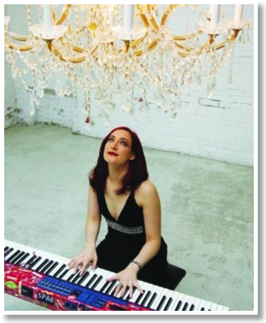
Sage is currently on national tour and took time from her busy schedule to chat with Jupiter Index.
Mark Lopez: What other musicians in the industry have made a difference for you or inspired your music?
As a teenager, Loreena McKennitt was the first independent artist of whom I became aware who was as prolific as I had always hoped I'd be someday, and who seemed to have built a meaningful feeling of community around her music that far transcended making records. She had such a strong visual aesthetic, and she created a whole world around her work that made me want to do something equally expressive, in my own way.
A couple years later I encountered Ani DiFranco, and her incredible ability to connect so powerfully with her audience, and with such politically-charged music, further inspired me to start my own label and pretty much decide that it would be healthier for my development as an artist to forge my own way as an indie versus signing to a major.
Sarah McLachlan was also an extremely influential artist for me, not only in terms of her music, which is pretty much my definition of sonic perfection, but with respect to her creation of Lilith Fair. Her generosity in sharing her own success and talent with other artists at all levels of their careers, as well as her willingness to give a platform to various charitable and progressive political organizations via Lilith was absolutely a direct inspiration toward me starting our MPress Records "New Arrivals" Charity Compilation Series.
Other artists who've really made a difference for me in terms of the depth and range of their songwriting include Carole King, Indigo Girls, Suzanne Vega, Elvis Costello and Marc Cohn. I still listen to their albums over and over and am always humbled by just how powerful a great song can be.
What is the hardest thing about making a new record? is it the writing? Or the recording?
Writing the material is actually the easiest part about making new records for me. Tracking keyboards and arranging strings, horns, guitars is always pretty relaxed; I love playing and experimenting with sounds and collaborating with great musicians.
What's most challenging is producing my own vocals. It can be pretty difficult to be in the booth singing, trying to reinterpret your own material in a meaningful way, and keeping track in your head of how many takes you might've sung already, which ones were the best, what you might still need to try again because you know you can do it better, etc. It's definitely an exercise in creative multi-tasking!
You have a new album coming out this month: was there any particular challenges that arose during that recording process?
Well, I was also gearing up to move while making this record, which was a relatively prolonged process because I'd been in the same place for over a decade. So in the back of my mind when I started recording, I knew that within a few months my lease would be up, and I'd need to carve the time to get rid of the majority of stuff I'd accumulated over the years. I did it gradually, so it wasn't as stressful as it could've been, but it was still a lot of work and I was juggling a lot of different deadlines both musically and personally.
I tend to totally block out what's going on outside the studio when I'm working on a record, but this time around I had to strike more of a balance. Ultimately, I think it probably helped lend a certain focus to the music that otherwise might not have been there, because I was really making very big changes in my life, while cutting this album. It was impossible not to integrate all of that into the musical process too.
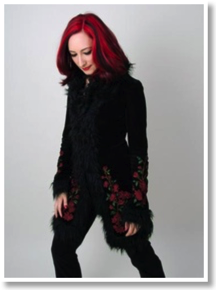
I think the impression people have is probably pretty accurate. As an artist I do like to be in as full creative control as possible when it comes to music production, graphics and the overall direction of my career. I'm pretty tough on myself and the words "obsessive" and "possessed" definitely get thrown around in terms of my personality. But on the flipside, I also hope that I'm helping to inspire other like-minded artists who feel, as I do, that there's really no limit to how expressive and productive anyone can be with the right support and encouragement. Only a few decades ago most professional performers were expected to act, sing and dance i.e. be a "triple threat". I often wonder, when did it become the exception for a performing artist to want to be as multi-dimensional and involved in the overall process as possible?
One of my childhood idols is Fred Astaire, and another is Keith Haring. Peter Gabriel and David Byrne are also people whom I admire enormously, and I'm fascinated by how they've managed to accomplish so much beyond the framework of their own wildly successful careers as musicians. They kept pushing themselves, supporting other artists' work which they admired, and stretching the boundaries of their own abilities. When I get sidetracked or burned out by the "biz" - which definitely happens - all I have to do is think about any one of those artists and the emotional impact they've had upon me, and it's instantly uplifting.
My friends and family have the distinct impression that it's really hard to tear me away from something when I'm "involved" - they tease me about it because it's an easy mark. My band mates joke about me not even leaving the hotel when I'm on tour a lot of the time because I'm on the computer designing, writing music or otherwise engaged in promotional work.
But something that does get lost sometimes is just how genuinely passionate I still am about playing live. The opportunity to play live music on a nightly basis is something of which I'm so protective, and it's something I need to be careful about because I'm always trying to find better opportunities along those lines. If I had my way, I'd never sleep, eat or have an unproductive moment. But thankfully, there are people in my life who care about me too much to let me have my "way" entirely!
Some people view music as being progressive and some view it as lacking the soul and spirit of past musical generations: what's your take on music today?
I think there's more great music than ever, but it's definitely a matter of unearthing it - which for me, happens in the clubs, coffeehouses and listening rooms that take chances on artists who don't have big record deals and don't have the resources to get on TV.
Tonight, I actually heard a young artist named James Ethan Clark in a wine-bar next door to the venue where I'd played earlier, and he absolutely blew me away. He played keys, harmonica and guitar, had a voice reminiscent of Paul McCartney but a writing style all his own, and I was rapt listening to him for 40 minutes, even though I had no idea who he was and intended to just go in to get a drink. I have experiences like this fairly regularly at clubs like Rockwood Music Hall in NYC, Hotel Cafe in L.A., SXSW and CMJ. Conversely, there's a lot of music that seems somewhat generic and disposable, but there has probably always been.
I think the most important thing to remember is that radio and TV are feeding us such an infinitesimal sampling of the music that's out there, and that the internet and live music venues are really powerful sources for discovering great new artists.
I used to feel like I was "born in the wrong era" and that all the best, most soulful music was in the past. But we recently signed an artist to MPress, Seth Glier, who is as lyrically insightful and naturally gifted as any musician I've ever admired from another era. It's been a really humbling experience to work with him, and remember why I got into music in the first place.
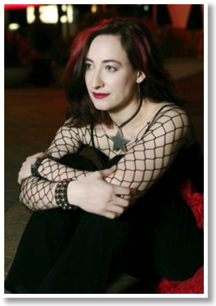
Obviously the biggest shift is how much music-discovery takes place in the internet now, versus in stores or on terrestrial radio. It's beyond noteworthy and is continually of interest because an indie artist is always trying to get more listeners to "discover" him/her; it impacts every aspect of how we market both my own and our other artists' music at MPress, and utilizing Social Networks i.e. Facebook etc. has become one of the most proactive ways we can spread the word about live shows. I definitely didn't see that coming 10 years ago, when designing and passing around a Kinko’s' flyer was still the most impactful way to advertise one's local gig.
What advice would you give to an up-and-coming musician?
I've said this before, but I stick by it: play as often as you possibly can, and don't be precious about it. Not only do you never know who might be listening, but shedding is the only way to really figure out what you have to offer as an artist that's uniquely powerful. That takes a lot of time! Even the most naturally talented musicians still need many opportunities to develop stage-banter, a "vibe", and essentially, an on-stage persona. That's ultimately what separates a very true musician from one merely full of potential...the ability to connect with any audience, however large or small.
The other thing I'd say is to remember that no one can do this alone. Cherish your fans, and remember to include them as much as possible every step of the way. There are more ways than ever to do that, but the bottom line is that it's important to be accessible. I've gotten a lot of meaningful advice from my own listeners over the years, and I try to always be open to their feedback because no one has a monopoly on great ideas!
by Mark Lopez
Near the Sun
Multi-instrumentalist French/Canadian indie rocker Julie Peel has released her full-length debut album Near the Sun, a folk-rock effort with influences ranging from Aimee Mann to Neil Young.
Peel has also graced a number of American Laundromat Records compilations, including tributes to the popular band the Cure and the Breeders’ Kim Deal.
Currently Peel is touring in support of her album and is looking forward to performing during the coming South by Southwest music conference in Austin, Texas.
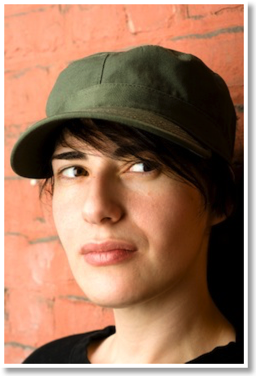 Jupiter Index: What focused you to write and perform music?
Jupiter Index: What focused you to write and perform music?
Julie Peel: Frankly I didn't really care about music much when I was younger. It was all about movies. I wanted to be a movie director.
The first album I bought was Little Earthquakes by Tori Amos, when it came out (‘92) and it was a whole new experience to me (before that, I was only listening to music scores, and old jazz and blues singers) I mean, Tori was a real storyteller, and I could really relate to what she was singing. A year after that, a friend of mine introduced me to The Pixies. and that's when I decided to buy a drum kit and be in a band, and maybe a year later I borrowed my friend's guitar and started to play it, without really knowing what I was doing (no real chords) I began watching MTV unplugged and figured out chords played by Neil Young, Bob Dylan, Kurt Cobain. never had a teacher, except for them.
Which instruments do you play?
I play a few instruments, but I don't excel at any. Guitar (Martin acoustic, Fender acoustic, Fender telecaster), piano, harmonica (Honer Blue Harp mostly), banjo, lap steel guitar, ukulele, drums (a mix of different parts I gathered since I was 14), bass (Fender jazzbass, Epiphone SG).
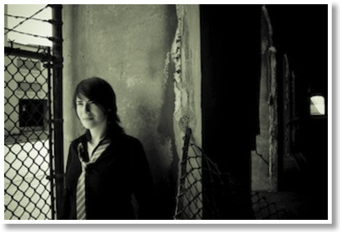 It has been said that you enjoy listening to Aimee Mann, Beth Orton, and Neil Young. How have they influenced your music?
It has been said that you enjoy listening to Aimee Mann, Beth Orton, and Neil Young. How have they influenced your music?
I've been listening to Neil Young since I was a kid, because of my mom's records and I discovered Aimee Mann and Beth Orton's music in my teens. I'm not sure they've influenced me directly, but I sure would love to be able to write songs as good as these three.
Tell us how did the track Alone come about?
I think I was strumming my Ukulele, and it just came out. I remember the words coming along right away.
Do you have a certain way of writing your songs?
I guess I have. It usually starts with the musical composition, then the vocal melody, that I usually hum along the music, but the humming often leaves place to what we call "yogurt" in France, meaning, humming mixed with almost words, and out of this gobbledygook, one or two words often stand out. I know this can sound weird, but they are, somehow, the words I needed, and they're gonna set the tone but also the subject of the song.
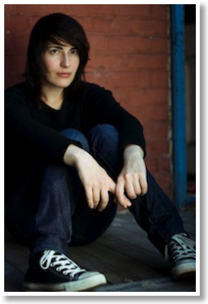 There is a lot going on musically with your music. Would you say your album is biographical in nature?
There is a lot going on musically with your music. Would you say your album is biographical in nature?
I think it is. But I can't really explain it. I know people expect me to explain what I'm trying to say in my songs, but I think they're pretty easy to understand.
What are your hopes for your music at this time?
Evolve. Become a better songwriter and musician.
Would you like to share anything else about your music?
I'm working on new songs, and will probably have new songs on my MySpace player in a few months! I'm also working on an indie-rock project, and an electro-rock project.
Julie Peel answered Jupiter Index’s interview questions via email.
Peel has also graced a number of American Laundromat Records compilations, including tributes to the popular band the Cure and the Breeders’ Kim Deal.
Currently Peel is touring in support of her album and is looking forward to performing during the coming South by Southwest music conference in Austin, Texas.

Julie Peel: Frankly I didn't really care about music much when I was younger. It was all about movies. I wanted to be a movie director.
The first album I bought was Little Earthquakes by Tori Amos, when it came out (‘92) and it was a whole new experience to me (before that, I was only listening to music scores, and old jazz and blues singers) I mean, Tori was a real storyteller, and I could really relate to what she was singing. A year after that, a friend of mine introduced me to The Pixies. and that's when I decided to buy a drum kit and be in a band, and maybe a year later I borrowed my friend's guitar and started to play it, without really knowing what I was doing (no real chords) I began watching MTV unplugged and figured out chords played by Neil Young, Bob Dylan, Kurt Cobain. never had a teacher, except for them.
Which instruments do you play?
I play a few instruments, but I don't excel at any. Guitar (Martin acoustic, Fender acoustic, Fender telecaster), piano, harmonica (Honer Blue Harp mostly), banjo, lap steel guitar, ukulele, drums (a mix of different parts I gathered since I was 14), bass (Fender jazzbass, Epiphone SG).

I've been listening to Neil Young since I was a kid, because of my mom's records and I discovered Aimee Mann and Beth Orton's music in my teens. I'm not sure they've influenced me directly, but I sure would love to be able to write songs as good as these three.
Tell us how did the track Alone come about?
I think I was strumming my Ukulele, and it just came out. I remember the words coming along right away.
Do you have a certain way of writing your songs?
I guess I have. It usually starts with the musical composition, then the vocal melody, that I usually hum along the music, but the humming often leaves place to what we call "yogurt" in France, meaning, humming mixed with almost words, and out of this gobbledygook, one or two words often stand out. I know this can sound weird, but they are, somehow, the words I needed, and they're gonna set the tone but also the subject of the song.

I think it is. But I can't really explain it. I know people expect me to explain what I'm trying to say in my songs, but I think they're pretty easy to understand.
What are your hopes for your music at this time?
Evolve. Become a better songwriter and musician.
Would you like to share anything else about your music?
I'm working on new songs, and will probably have new songs on my MySpace player in a few months! I'm also working on an indie-rock project, and an electro-rock project.
Julie Peel answered Jupiter Index’s interview questions via email.
In the Present: Up-and-Coming Artists
Sometimes, when words fail, music does a better job of speaking. This article highlights a wide array of artists who have come up with top-ten lists of emerging musicians that seem to speak well while creating music that offers something new to the listener.
Ian Anderson

For more than 40 years, the eclectic flute music of Ian Anderson has according to the band’s Website (Jethro Tull) have “undertaken more than 2500 concerts in 40 countries through out three decades.” Anderson himself plays on “average 100 shows a year and continues to release new records – his last was a live album (Ian Anderson Collection) in 2006. Read More...
Nina Diaz

Signed to legendary Joan Jett’s Blackheart Records, the San Antonio-based all-female band, named after a classic song (“Girlfriend in a Coma”) by the seminal British act the Smiths, have gained attention for their brand of alternative rock/punk music. Fronted by vocalist and guitarist Nina Diaz, the group has performed at the South by Southwest music conference in 2007 and performed on the True Colors Tour in 2008. Read More...


